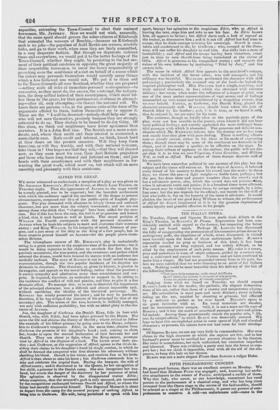THE ITALIAN OPERA.
ON Tuesday, Signor and Signora RIMINI made their d6buts at the King's Theatre, in Dcza.nsi's Il Pirata. Expectation had been con- siderably excited with regard to the former, but respecting the latter we had not heard much. Perhaps M. LAPORTE has discovered the folly of exaggerating the pretensions of his successive prime donne by anticipatory puffs, the emptiness of which, when discovered, is visited must severely upon the heads of these unfortunate ladies. RIMINI'S reputation needed no prop or buttress of this kind ; it has been too well earned, too long enjoyed, and too widely diffused, to be aided by the employment of such petty means. His voice is a tenor, pure and melodious in tone, of ample compass, guided by a correct ear, and a cultivated and correct taste. Nature and art have combined to make him a singer. He had not proceeded twenty lines in his part, be- fore we were satisfied that we were listening to an artist of the highest rank. Nothing could be more beautiful than his delivery of the last of the following lines.
" Nell furor delle tempeste, nelle stragi del Pirata
Quell' immagine adorata si presents at alio pensier,
Come un angelo celeste, di virtude consiglier."
Judging from what we heard on Tuesday, we should expect RIMINI'S forte to be the tender, the pathetic, the elegant demonstra- tions of Isis art, rather than those of a stormy and tempestuous charac- ter. His articulation is most pure and most distinct ; every syllable falling on the ear, unaided by shouting or grimace, but effected by a delivery as perfect as we ever heard. BELLINI'S opera is
no great favourite with us. It vocal materials are slender, and its instrumentation meagre. Still, it is not a mere servile copy of Rossixr ; and it has the merit of occasional passages of pure and grace. ful melody. Among these preeminently stands the popular aria, " Ah, non fia sempre odiata," in which Ilt•I;IN1 was deservedly encored. We hope to hear this accomplished artist in some opera of high and classical character ; at present, his talents have not had room for their develop- ment.
Of Signora RIMINI we can say very little in commendation. Her own claims to the high character to which she aspires are few, and to her husband's power must be ascribed her present situation in the theatre. Her voice is unmelodious, her style unfinished, her execution imperfect and laboured. There was evidently a party sent into the house to sup. port her ; but we think it impossible, even with all the aid of the cla. queers, to keep this lady on her throne.
Rearm was not a more elegant Pirate than Samara a vulgar Duke.



























 Previous page
Previous page